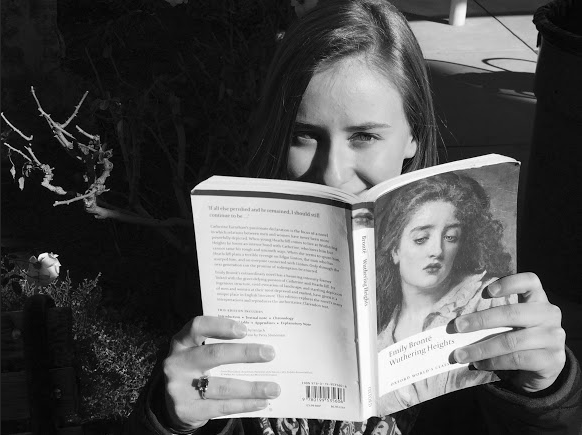R.I.P Romance: Wuthering Heights

March 7, 2016
Did you get roses this Valentine’s Day? Neither did Catherine Earnshaw.
Over winter break I read Emily Brontë’s 1847 novel, Wuthering Heights. Brontë’s one and only novel often frequents the lists of the Top 100 books in the English language, and is cited by lovers of Jane Austen and modern fiction alike as a favorite. So what makes this book so great?
One of the three writing-inclined Brontë sisters, Emily published her novel under the nom de plume Ellis Bell, as at the time, writing was almost exclusively a man’s job—and very covertly a woman’s. Accordingly, Emily Brontë cleverly masks her gender through layering the narrative structure. Although the first narrator is a 30-year-old male, who rents the estate of Thrushcross Grange, the story is primarily told from the perspective of the loyal servant Ellen “Nelly” Dean. This gave Brontë the freedom to perhaps write in a female perspective while veiled by the male first narrator.
Could the audience tell that a woman wrote this novel? No, though at the time of publication, James Lorimer from North British Review1 critiqued that Wuthering Heights had “all the faults of Jane Eyre” multiplied a thousand times in degree. Since the reviewer in 1847 did not know that Emily Brontë’s sister had written Jane Eyre, it is especially ironic that he linked the two novels. This evidences that her writing style was distinct to the sisters, if not completely distinct to women.
As for its qualifications as a love story, Wuthering Heights is classified a romance novel by 19th century standards, but you will not find it on the shelf with the candy-read, feel-good, romance novels at the bookstore. And if you’re looking for roses and gentlemen pulling out the chair at supper, you had best be on your way clear out of the Heights. This is an unforgiving, tumultuous Gothic romance, filled with violence, ghosts, storms, tragedy, and loathing. Brontë’s Catherine and Heathcliff wage war against society and even against each other, but their love is so sweeping that it washes over into the next generation, plaguing the insular household and their respective children with revenge.
In fact, the book is better known for the cruelty of its characters, and many readers dislike or hate every single one. To put it in perspective, descriptions of Heathcliff range from a “rough as a saw-edge” (29) “imp of Satan” (34) and “a continual nightmare” (95), to a “hellish villain” (122) with “basilisk eyes” and a “ferocious sneer” (158), which is hardly heartthrob material. Comparatively, Catherine, is a “minx…a changeling—wicked little soul” (22), an “impertinent little monkey” (90), a “poisonous friend (91), and “a liar to the end” (147). Sound like a romance yet?
Despite filling the novel with name-calling and open animosity, Brontë breaks her modus operandi for moments of searing emotion and poignancy, in passages that burrow their way into your chest. I wouldn’t call them sweet, per se, but grand.
Heathcliff and Catherine love each other so much, that even though Heathcliff feels murdered by Catherine’s insults and indifference, he “loves [his] murderer” (140). Catherine refers to Heathcliff as part of herself, then rejects him. When Heathcliff thinks her gone, he beats his head against the tree, waits outside her house for a week, puts his hair in her locket, and begs her to “haunt” (148) him for as long as he lives so that she will always be near. Even when Catherine herself leaves Wuthering Heights for the final time, her presence literally and figuratively haunts the entire novel through Heathcliff’s love. He revenges society and all others who kept them separated, going so far as to deprive their children of happiness, drive her husband into misery, and play the matchmaker from hell: all this to properly honor Catherine’s memory.
This romance is really more of a tragedy. Only when all traces of Catherine and Heathcliff’s violent love are obliterated can the other characters commence their own stories. Will they succeed?
Pick up Wuthering Heights and find out.


